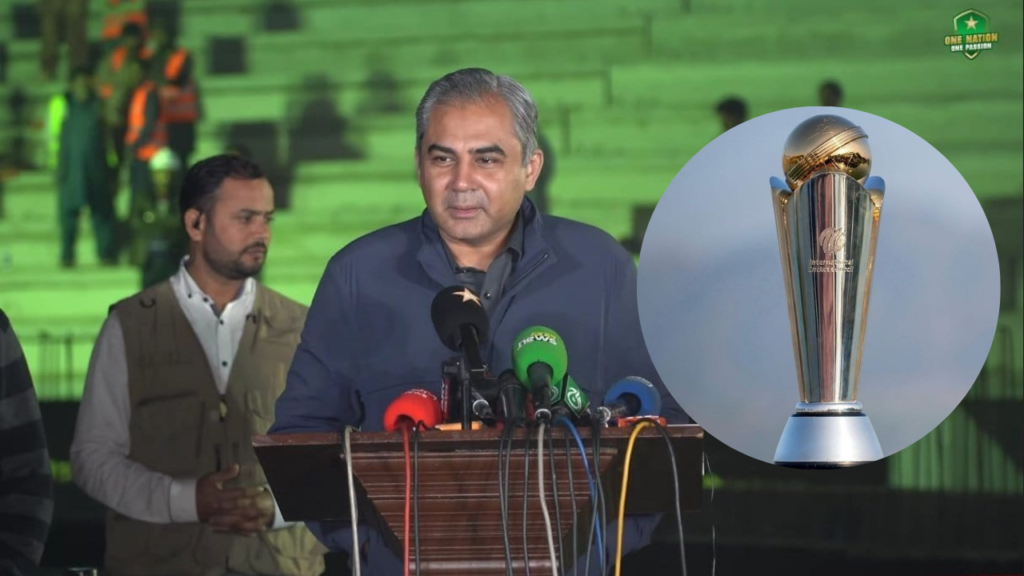
The grapevine has it that the Pakistan Cricket Board (PCB) is putting pressure on the International Cricket Council (ICC) for a written guarantee from the Board of Control for Cricket in India (BCCI) that the next four ICC events in India will be played based on a hybrid model as well. The PCB, according to sources, wants the agreement to be legally binding.
A story is doing the rounds that the Pakistan cricket hierarchy is not comfortable with the term hybrid for the Champions Trophy, scheduled to be played in February-March next year. PCB chairman Mohsin Naqvi has publicly spoken about not accepting a hybrid model for the tournament and wants the ICC to use a different term as a face-saving exercise.
Nomenclature is the least important thing in the entire Champions Trophy imbroglio. Whatever term is used for the model – hybrid or fusion, or any other term – it doesn’t change the fact that India won’t be travelling to Pakistan and will play their matches in a second country, likely in Dubai. This is exactly what the BCCI has requested in its communication to the game’s governing body, as it didn’t get the Indian government’s approval to send the team across the border due to security reasons for the eight-team ODI event.
It is also very unlikely that the BCCI will give a written guarantee, agreeing to a hybrid model for the future ICC tournaments in India – that all the future India-Pakistan matches will be played in Dubai. The next four ICC events in India are the 2025 women’s ODI World Cup, the 2026 men’s T20 World Cup, the 2029 men’s Champions Trophy and the 2031 men’s ODI World Cup. The PCB ostensibly wants tit for tat – if India don’t come to Pakistan for the Champions Trophy, Pakistan, too, will not go to India for the future global events. Unfortunately, the PCB stands isolated in the ICC, as it is learnt that all the other participating boards are OK with a hybrid model for the Champions Trophy – India playing their matches at a neutral venue.
Unlike the job of BCCI secretary, where it was difficult to move away from his father’s shadow, the top ICC job gives #JayShah a chance to script his own narrative, and also to lead world cricket in new directions.@BoriaMajumdar writes https://t.co/8AnKEMXQnK
— RevSportz Global (@RevSportzGlobal) December 2, 2024
From the BCCI’s perspective, it would be illogical to submit a written guarantee for something that cannot be predicted. Bilateral relations between the two neighbours can be fluid. Things can change in the future.
“Those written guarantees do not hold much value,” said Kamran Akmal, former Pakistan wicketkeeper, speaking to RevSportz. “Earlier also, the two boards had a written agreement on playing a certain number of bilateral series, but that didn’t happen.”
The PCB did a lot of posturing ahead of last year’s Asia Cup as well before accepting a hybrid model, with India playing their matches in Sri Lanka. Pakistan also came to India for the 2023 ODI World Cup. “I hope this time things are settled on the basis of parity
,” said Akmal. “It’s a matter of self-respect, and so far, Naqvi saab has talked logic. Then again, a hybrid model cannot be a permanent solution. India and Pakistan should start playing against each other. Politics should be kept out of sporting events.”
As RevSportz had earlier reported, the PCB has all but agreed to a hybrid model with certain riders. Back-channel negotiations are on to find out a workable solution, “a new formula”, according to some PCB insiders. Meanwhile, Emirates Cricket Board head Mubashir Usmani is said to be working as a mediator between the PCB and the BCCI.
For all sports updates, follow RevSportz



